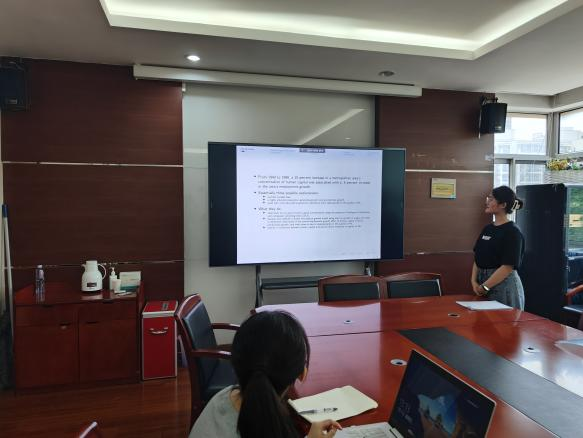国际经济管理学院研究生workshop 2023年春季学期第11期
时间: 2023-05-18 10:19:00
研究生workshop由首都经济贸易大学国际经济管理学院主办。主要内容:一是研究生报告前沿或经典文献,二是研究生报告自己的研究或研究设想。论坛宗旨是:为学院师生搭建一个学术交流平台,营造浓厚学术氛围;通过对经典论著或前沿文献的研讨,拓宽研究生的理论视野,提升研究生的前沿方法运用能力,帮助研究生提高论文写作质量。
本期workshop
报告人1:梁思源(2022级博士研究生)
导师:高静
报告论文:《Economic policy uncertainty, cost of capital, and corporate innovation》Journal of Banking and Finance,2020 作者:Zhaoxia Xu

报告摘要:
We examine the impact of government economic policy uncertainty (GEPU) on corporate innovation and identify a cost-of-capital transmission channel. We find that GEPU increases firms’ cost of capital, which translates into lower innovation. As economic policy uncertainty rises, firms with more exposure to such uncertainty face a higher weighted average cost of capital and innovate less. Innovations of financially constrained firms and firms relying on external finance in a competitive environment are affected more. Our study provides novel evidence that higher economic policy uncertainty hinders innovation not only through the traditional investment irreversibility channel, but also through the cost-of-capital channel.
报告人2:温新娇(2022级博士研究生)
导师:杨欣桐
报告论文:《Smart Cities: Quality of Life, Productivity, and the Growth Effects of Human Capital》, The Review of Economics and Statistics, 2006 作者:Jesse M. Shapiro

报告摘要:
From 1940 to 1990, a 10 percent increase in a metropolitan area's concentration of college-educated residents was associated with a .8 percent increase in subsequent employment growth. Instrumental variables estimates support a causal relationship between college graduates and employment growth, but show no evidence of an effect of high school graduates. Using data on growth in wages, rents and house values, this paper calibrates a neoclassical city growth model and find that roughly 60 percent of the employment growth effect of college graduates is due to enhanced productivity growth, the rest being caused by growth in the quality of life. This finding contrasts with the common argument that human capital generates employment growth in urban areas solely through changes in productivity.




